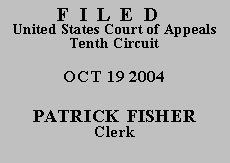 UNITED STATES COURT OF APPEALS
UNITED STATES COURT OF APPEALS
 UNITED STATES COURT OF APPEALS
UNITED STATES COURT OF APPEALS
| ROBERT CRISWELL, |
|
| v. | |
| GARY WATKINS, and
WTHE ATTORNEY GENERAL OF THE STATE OF COLORADO, |
|
I. BACKGROUND
Mr. Criswell pleaded guilty in March 1993 to one count of second-degree murder and was sentenced to forty-eight years' imprisonment. Though the petitioner did not directly appeal his judgment of conviction, he filed several motions from 1996 to 2002 for post-conviction relief in state court; all were denied.
In October 2002, Mr. Criswell filed his § 2254 petition in federal district court and asserted four claims for relief. In Claim One, he alleged ineffective assistance of counsel, in violation of his Sixth Amendment rights, because his counsel did not interview the chief medical examiner who performed the victim's autopsy. Mr. Criswell alleged in Claims Two and Three that his conviction and sentence violated his due process rights because he was not separately charged with a "crime of violence" and did not plead guilty to a "crime of violence," in violation of his Fifth, Sixth and Fourteenth Amendment rights. The petitioner asserted in Claim Four that his conviction violated his Sixth Amendment right to effective counsel because his counsel was not aware of the "crime of violence" sentence enhancement.
The magistrate judge concluded in May 2003 that Mr. Criswell had not exhausted Claim Four and recommended that all claims be dismissed. The district court adopted the magistrate judge's recommendation in part, dismissing Claims Two, Three and Four. The district court, however, rejected the recommendation in part and remanded to the magistrate judge to make factual findings about Claim One under 28 U.S.C. § 2254(d)(2). After additional review, the magistrate judge recommended dismissal of Claim One, and the district court adopted the supplemental recommendation in March 2004. Mr. Criswell now seeks a COA so he may appeal the district court's ruling on the first three claims.
II. DISCUSSION
We may issue a COA and entertain Mr. Criswell's appeal only if he "has made a substantial showing of the denial of a constitutional right." 28 U.S.C. § 2253(c)(2). To make a substantial showing, Mr. Criswell "must show that reasonable jurists could debate whether (or, for that matter, agree that) the petition should have been resolved in a different manner or that the issues presented were adequate to deserve encouragement to proceed further." Miller-El v. Cockrell, 537 U.S. 322, 336 (2003) (internal quotation marks omitted).
Colorado state courts have already adjudicated Mr. Criswell's habeas claims on the merits. We may therefore grant habeas relief only where a state court decision was "contrary to, or involved an unreasonable application of, clearly established Federal law, as determined by the Supreme Court" or was "based on an unreasonable determination of the facts in light of the evidence presented in the State court proceeding." 28 U.S.C. § 2254(d). Furthermore, "a determination of a factual issue made by a State court shall be presumed to be correct. The applicant shall have the burden of rebutting the presumption of correctness by clear and convincing evidence." Id. § 2254(e)(1). We have also recently held that this "deferential treatment of state court decisions must be incorporated into our consideration of a habeas petitioner's request for COA." Dockins v. Hines, 374 F.3d 935, 938 (10th Cir. 2004).
Applying this deferential standard, we have reviewed the magistrate judge's recommendation and supplemental recommendation, the two district court orders, the petitioner's brief and the entire record on appeal. For substantially the same reasons set out in the magistrate judge's thorough recommendation and supplemental recommendation, and the district court's orders addressing objections to the recommendations, we conclude that Mr. Criswell has not made a "substantial showing of the denial of a constitutional right" under 28 U.S.C. § 2253(c)(2). Colorado courts reasonably applied Sixth Amendment law to Claim One when ruling that counsel's failure to interview the medical examiner did not constitute ineffective assistance of counsel. Concerning Claims Two and Three, the petitioner admitted the elements of a "crime of violence" by pleading to second-degree murder, and no separate charge was required to support the sentence enhancement. See Colo. Rev. Stat. § 16-11-309(2)(a)(II)(B) (relocated to § 18-1.3-406(2)(a)(II)(B)).
We therefore DENY Mr. Criswell's application for a COA. We also DENY his motion to proceed IFP and DISMISS the appeal.
Entered for the Court,
Robert H. Henry
Circuit Judge